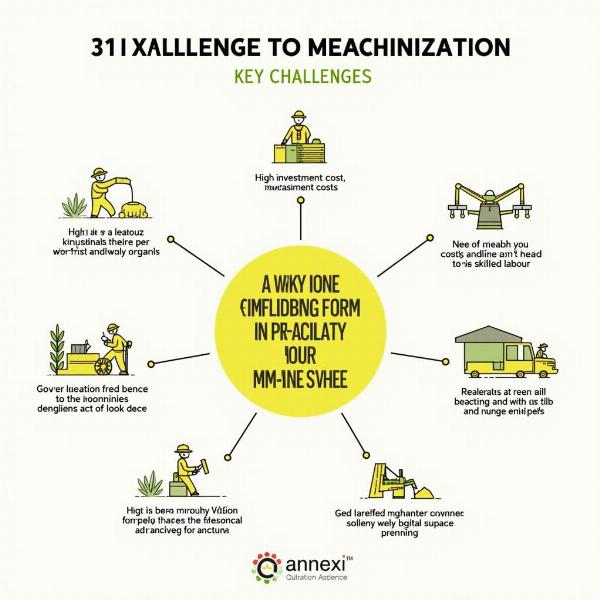Mechanisation, a term increasingly relevant in modern India, signifies the process of using machines to perform tasks previously done by hand or with animal power. Understanding its meaning in Hindi, along with its implications, is crucial for navigating the evolving landscape of Indian industry and agriculture. This article delves into the various facets of mechanisation, its Hindi translations, and its impact on Indian society.
Understanding the Core Concept of Mechanisation
Mechanisation isn’t just about replacing human effort with machines; it’s about enhancing efficiency, productivity, and overall output. It involves introducing technology to streamline processes, improve quality, and reduce reliance on manual labour. In the context of India, mechanisation holds immense potential for transforming various sectors, from agriculture to manufacturing. Think about how tractors have revolutionised farming practices or how automated assembly lines have boosted industrial production. These are just a few examples of the far-reaching effects of mechanisation.
Mechanisation Meaning in Hindi: Exploring the Translations
The Hindi translation of mechanisation can vary depending on the specific context. Commonly used terms include “यंत्रीकरण” (yantrikaran), which directly translates to “mechanisation,” and “मशीनीकरण” (mashinikaran), emphasizing the use of machines. Other terms like “औद्योगीकरण” (udyogikaran), meaning “industrialisation,” may also be used when referring to the broader impact of mechanisation on industry. The nuances of each term are important for accurately conveying the intended meaning.
The Impact of Mechanisation on Indian Agriculture
Agriculture, the backbone of the Indian economy, has significantly benefited from mechanisation. The introduction of tractors, harvesters, and other agricultural machinery has increased crop yields, reduced labour costs, and improved the overall efficiency of farming practices. This has led to greater food security and improved livelihoods for many farmers. However, it’s important to address the challenges associated with mechanisation, such as access for small-scale farmers and the potential for displacement of agricultural labourers.
Mechanisation in Indian Industries: Driving Growth and Efficiency
Mechanisation has played a pivotal role in the growth of various Indian industries, including manufacturing, construction, and mining. Automated processes, advanced machinery, and robotics have enhanced productivity, improved product quality, and reduced operational costs. This has contributed to India’s economic development and its integration into the global market. Furthermore, mechanisation has also created new job opportunities in areas such as machine operation, maintenance, and technology development.
Addressing the Challenges of Mechanisation in India
While mechanisation offers numerous advantages, it also presents certain challenges that need to be addressed. These include the high initial investment costs, the need for skilled labour to operate and maintain machinery, and the potential impact on employment in traditional sectors. Furthermore, ensuring equitable access to technology for all segments of society is crucial for maximising the benefits of mechanisation.
 Challenges of Mechanisation in India
Challenges of Mechanisation in India
Conclusion: Embracing the Future of Mechanisation in India
Mechanisation is a transformative force that has significantly impacted various sectors of the Indian economy. Understanding its meaning in Hindi and its implications is essential for navigating the evolving landscape of Indian industry and agriculture. By addressing the challenges and ensuring equitable access to technology, India can harness the full potential of mechanisation to drive sustainable growth and development.
FAQs
- What is the most common Hindi word for mechanisation? यंत्रीकरण (yantrikaran) is the most common and direct translation.
- How has mechanisation impacted Indian farmers? It has increased yields, reduced labour costs, and improved farming efficiency.
- What are the challenges of mechanisation in India? High investment costs, need for skilled labour, and potential job displacement are key challenges.
- What are the benefits of mechanisation in industries? Increased productivity, improved product quality, and reduced operational costs are key benefits.
- Why is understanding mechanisation important in India? It is crucial for understanding the changes in Indian industry and agriculture and for navigating future developments.
- What is the difference between yantrikaran and mashinikaran? While both mean mechanisation, mashinikaran emphasises the use of machines.
- How can India overcome the challenges of mechanisation? By addressing skill gaps, providing access to finance, and promoting sustainable practices.
About Meaning-Hindi.in
Meaning-Hindi.in is your trusted partner for all your Hindi translation needs. We provide a comprehensive range of translation services, including business and commercial document translation, certified and legal document translation, technical and user manual translation, website and localization services, educational and academic document translation, express translation, and specialized translation services. Our expert linguists ensure accurate and culturally sensitive translations that meet the highest quality standards. Contact us today to discuss your translation project and discover how we can help you bridge the language gap. Email: [email protected], Phone: +91 11-4502-7584. Connect with Meaning-Hindi.in today!